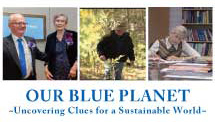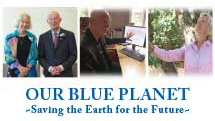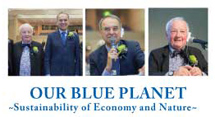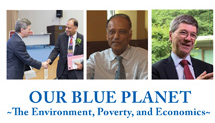Blue Planet Prize
Broadcasting Program of Laureates
 |
|
The 2018 winners were the Australian ecologist Brian Walker and the Swedish hydrologist Malin Falkenmark.
Prof. Walker, an Honorary Research Fellow of the Commonwealth Scientific and Industrial Research Organization (CSIRO), has had a most significant influence on the development of the concept of resilience in social-ecological systems and has highlighted the need to increase it to maintain human society under changing circumstances.
Hydrologist, Prof. Malin Falkenmark has focused her research on the rainwater which seeps into the soil, but which nobody had previously paid much attention to. She named it 'green water'. Falkenmark developed the groundbreaking concept that it is possible to cultivate crops even on dry land if farming methods are created to use this green water effectively. She continues to advocate the importance of green water for the future of humankind as a solution to the food issues caused by population growth.
|
 |
|
2017 winners are Professor Hans J. Schellnhuber, a theoretical physicist from Germany, and Professor Gretchen C. Daily, a biologist from the United States.
Professor Hans J. Schellnhuber, Founder and Director of the Potsdam Institute for Climate Impact Research (PIK), launched a new research approach to help solve global warming.
The other prizewinner, the biologist Professor Gretchen C. Daily, has urged the necessity of the coexistence of Nature conservation and economic development while putting a value on ecosystems.
We will introduce the two prizewinners'respective devotion to saving the Earth for the future.
|
 |
|
2016 winners are Mr. PavanSukhdev, an environmental economist from India and Professor Markus Borner, the zoologist from Switzerland.
Mr. Sukhdevhas contributed in the development of the green accounting, which factors and valuates the profit from natural capital into the financial results of operations. He has introduced its practical method to measure the pressure imposed on the natural environment.
The other prize winner, the zoologist professor Markus Borner, has dedicated nearly 40 years of his life to conserve the rich diversity in Serengeti National Park, Tanzania. He protected the animals from the hands of poachers, saved black rhinoceros from the verge of extinction, and encouraged the revision of the highway road which would have blocked the great immigration of gnus. We will introduce how each winner has strived to the consistency in coexistence of economic development and conservation of nature and their devotion to keep the blue planet from the different ground.
|
 |
|
The Blue Planet Prize is an annual award presented to individuals or organizations worldwide in recognition of outstanding achievements leading to solutions to global environmental problems. The 2015 winners are two world-leading economists, Sir Partha Dasgupta of the University of Cambridge (UK) and Prof. Jeffrey Sachs of the Earth Institute of Columbia University (USA).
Sir Dasgupta has advanced the study of poverty in developing countries in the context of environmental resources. He developed a new kind of measurement to accurately assess a country’s well-being and sustainability, urging governments to adopt it to make better economic policy decisions. Prof. Sachs devised his own method to overcome economic crises, and travels the world to spread sustainable development. As an advisor to the United Nations, he has been a leader in eradicating extreme poverty in developing countries.
The program introduces the two 2015 Blue Planet Prize laureates and their incredible achievements in protecting our blue planet.
|
 |
|
|
|
The Blue Planet Prize is an annual award presented to individuals or organizations worldwide in recognition of outstanding achievements leading to solutions to global environmental problems.
The 2014 winners are ecological economist Dr. Herman Daly (USA), and joint-recipients biologist Dr. Daniel Janzen (USA) and the National Biodiversity Institute of Costa Rica (INBio).
Dr. Daly pioneered “ecological economics,” incorporating such factors as the environment, local communities, quality of life, and ethics into economic theory. Dr. Janzen has been working for many years on the restoration and conservation of tropical forests in Costa Rica. INBio, together with Dr.Janzen, has created a biodiversity inventory and promoted environmental education.
The program features 2014 Blue Planet Prize laureates discussing how humans can contribute to protect the future of our blue planet.
|
 |
|
| |
The Blue Planet Prize is given annually in recognition of scientific research leading to solutions to global environmental problems.
The 2013 winners are Principal Scientist Taroh Matsuno of Japan Agency for Marine-Earth Science & Technology, and Dr. Daniel Sperling of University of California, Davis.
Dr. Matsuno has devoted his research to atmosphere dynamics and contributed to international awareness of climate change. Dr. Sperling is known as a leading expert on energy and environmental aspects of transportation and has bridged academia, government and industry.
The program features Blue Planet Prize laureates discussing what the earth needs and how humans can help.
|
 |
|
Click below for Chinese title version (230MB)
我们该为地球所做的事 |
The Blue Planet Prize is given annually in recognition of scientific research leading to solutions to global environmental problems.
The 2012 winners are Professor William E. Rees of the University of British Columbia, Dr. Mathis Wackernagel, President of the Global Footprint Network, and Professor Thomas E. Lovejoy of George Mason University. Rees and Wackernagel developed “Ecological Footprint analysis.” Lovejoy pioneered the understanding of “human-caused habitat fragmentation” and its effects on biodiversity.
The program features Blue Planet Prize laureates discussing what the earth needs and how humans can help.
|
copyright © The Asahi Glass Foundation. All rights reserved.